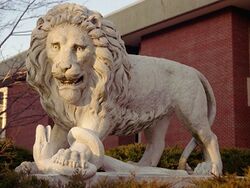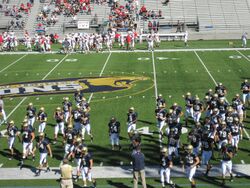The College of New Jersey
Topic: Organization
 From HandWiki - Reading time: 15 min
From HandWiki - Reading time: 15 min
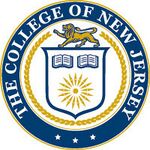 | |
Former names | New Jersey State Normal School (1855–1908) New Jersey State Normal School in Trenton (1908–1929) New Jersey State Teachers College and State Normal School at Trenton (1929–1937) New Jersey State Teachers College at Trenton (1937–1958) Trenton State College (1958–1996) |
|---|---|
| Motto | Essayez (French) |
Motto in English | "Try" |
| Type | Public university |
| Established | 1855[1] |
Academic affiliations | Sea-grant, Space-grant |
| Endowment | $39.8 million (2020)[2] |
| President | Michael Bernstein |
| Provost | Jeffrey M. Osborn |
Academic staff | 821 (347 full time, 474 adjunct)[3] |
| Students | 7,340[3] |
| Undergraduates | 6,653[3] |
| Postgraduates | 687[3] |
| Location | Ewing , New Jersey , United States [ ⚑ ] : 40°16′16″N 74°46′58″W / 40.2712°N 74.7829°W |
| Campus | Suburban, 289 acres (117 ha)[4] |
| Annual | Seal [5] |
| Newspaper | The Signal [6] |
| |u}}rs | Navy Blue Gold[7] |
| Nickname | TCNJ Lions |
| Mascot | Roscoe the Lion |
| Website | www |
The College of New Jersey (TCNJ) is a public university in Ewing Township, New Jersey. It is part of New Jersey's public system of higher education. Established in 1855 as the New Jersey State Normal School,[1] TCNJ was the first normal school, or teaching college, in the state of New Jersey and the fifth in the United States.[8] It was originally located in Trenton proper and moved to its present location in adjacent Ewing Township during the early to mid-1930s. Since its inception, TCNJ has undergone several name changes, the most recent being the 1996 change from Trenton State College to its current name.[9]
The institution is organized into seven schools, all of which offer bachelor's degree programs and several of which offer master's degree programs.[10] Emphasis is placed on liberal arts education via the college's general education requirements.[11] Much of TCNJ is built in Georgian colonial revival architecture style on a 289-acre (117 ha) tree-lined campus.
History

The College of New Jersey was established on February 9, 1855, by an act of the New Jersey Legislature mandating the creation of a state normal school, making the New Jersey State Normal School the first teacher training institution in New Jersey and the ninth in the United States. Prior to this, then-Governor Rodman McCamley Price had actively promoted the notion of founding a training institute for New Jersey's teachers and helped to mobilize support among influential state leaders:

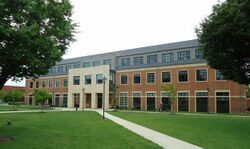
I recommend the establishment of a school for the education of teachers, similar to the schools established in many of the states, which are deemed to exert a most useful and beneficial influence in the cause of education in public estimation.
— Rodman McCamley Price, statement, January 1855[12]
For the first 73 years, the school was located in Trenton on Clinton Avenue. Beginning in 1925, the institution offered its first four-year baccalaureate degrees, and engaged in a transitional program of expansion. In 1928, a suburban tract of 210 acres (85 ha) was purchased in nearby Ewing Township and preparations were underway to relocate the college. The first building erected on the new campus was Green Hall, built in traditional Georgian colonial style. The majority of buildings now on campus reflect Green Hall's architecture. In 1996, in a move spearheaded by its president, Harold Eickhoff, The College of New Jersey adopted its current name.
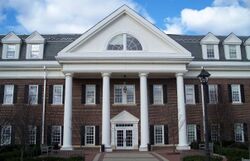
Programs in the graduate study were instituted in 1947, followed by accreditation from various national associations in the 1950s. The enactment of the Higher Education Act of 1966 paved the way for TCNJ to become a comprehensive institution by expanding its degree programs into a variety of fields aside from the education of teachers. By 1972, 70 percent of entering students were selecting non-education majors.[13]
- Names
- 1855 – New Jersey State Normal School
- 1908 – New Jersey State Normal School in Trenton
- 1929 – New Jersey State Teachers College and State Normal School at Trenton
- 1937 – New Jersey State Teachers College at Trenton
- 1958 – Trenton State College
- 1996 – The College of New Jersey
Academic
More than 50 liberal arts and professional programs are offered through the college's seven schools: Arts and Communication; Business; Education; Engineering; Humanities and Social Sciences; Nursing, Health and Exercise Science; and Science.
The College of New Jersey offers degrees in over 50 liberal arts and professional programs. TCNJ also offers a 7-year combined B.S./M.D. (Bachelor of Science/Doctor of Medicine) program for graduating high school students in conjunction with University of Medicine and Dentistry of New Jersey. Admission into this program is highly selective. This program offers guaranteed admission to UMDNJ upon completion of three years of undergraduate study at TCNJ and the maintenance of a minimum 3.5 GPA.
These programs are organized within seven schools:
- School of the Arts and Communication
- School of Business
- School of Humanities and Social Sciences
- School of Education
- School of Engineering
- School of Nursing, Health and Exercise Science
- School of Science
Global programs
The TCNJ Center for Global Engagement works together with TCNJ faculty to offer undergraduate students a wide variety of programs, from short-term, faculty-led study abroad programs to semester- and year-long programs in dozens of countries.
Rankings
According to U.S. News & World Report’s recent rankings, TCNJ ranks #5 in the Regional Universities North category.[14] U.S. News & World Report also ranks TCNJ the #1 in Top Public Schools in the Northeast USA, #2 in Best Colleges for Veterans, #7 in Most Innovative Schools, #6 in Best Undergraduate Teaching, top #100 in the United States in Best Value Schools as well as high ranking Engineering and Nursing programs.[14] The Princeton Review, in their recent ranking, ranked TCNJ #47 for the "Best Value College" rankings.[15]
Campus life
Residence halls
First-year students at TCNJ are either given a room assignment in Travers/Wolfe Tower, Centennial Hall, or any empty rooms in the Allen/Brewster/Ely Complex. Second-year students live in New Residence, Allen Hall, Brewster Hall, Ely Hall, Norsworthy Hall, Eickhoff Hall, Cromwell Hall, and Decker Hall. There are currently plans to construct another building specifically for second-year housing. Upperclassmen typically live in Townhouses South, East or West, or in one of the two newly constructed apartment complexes; Phelps Hall and Hausdoerffer Hall. Upperclassmen may also live in one of the various College Houses that surround the campus. While 95 percent of first-year students live on campus, only 50 percent of upperclassmen live on campus, instead choosing to live in homes and apartments surrounding the college.[16]
Campus Town
In 2013, groundbreaking began for The Campus Town complex. Consisting of seven buildings — Campus Town Clock Tower, apartments and recreation space — Campus Town was built by PRC Campus Centers LLC on 12 acres of property located on campus and it has 80,000 square feet of commercial space.[17][18]
The Campus Town complex has space to house 446 juniors and seniors in one-, two- and four-bedroom apartments. Each apartment has a living room/dining area, separate bedrooms, one or two bathrooms depending upon the unit, a full kitchen with a dishwasher and a full-sized washer and dryer. The complex has 500 parking spots.[19]
The Campus Town complex houses an 11,500-square-foot fitness center that replaced the college's 4,000-square-foot gym. The apartments and the fitness center are only open to the students, but the complex's retail stores are open to the public.[20] Barnes & Noble is an anchor tenant, with a 14,000-square-foot store. Other facilities include Panera, Jersey Mike's, a yogurt shop, sushi restaurant, convenience store and brewpub.[21]
Dining
There are currently ten Sodexo operated dining facilities on the TCNJ campus as well as a convenience store and bookstore (where convenience store-like food and beverages are sold). Eickhoff hall houses The Atrium at Eickhoff, the main dining hall, where students pay a door price and have access to buffet-style food, along with The 1855 Room, a staff/faculty dining room, and the convenience store. TDubs, the late-night dining hall, is located between the Travers and Wolfe towers. The Brower Student Center is home to three different dining facilities.
Entrepreneurship
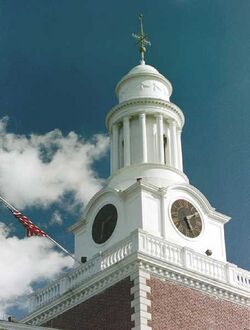
In the mid-2000s, TCNJ began to put a more concentrated effort on student entrepreneurship. Administrative resources were put toward counselling and workshops for students. The Mayo Business Plan Competition in April 2012 saw numerous student groups competing for $12,000 to launch their start-up businesses. The school has also held entrepreneurship events for local high school students.[22]
Student life

TCNJ has numerous student organizations managed by the Office of Student Activities and Leadership Development. TCNJ provides non-alcohol-related social events for students, including both on and off-campus activities such as musical and comedic performances. The College Union Board (CUB) sponsors visits by celebrities as well as movie showings, all of which are funded by the Student Finance Board. In April 2011, the College Union Board, Student Finance Board, and Student Government held their first annual Spring Carnival entitled "fun.ival" (fun.ival was named after live performers, fun.). In addition, nearby metropolitan areas such as Philadelphia and New York City are an hour and a half or less away by train.
Greek life at TCNJ are governed by the Inter-Greek Council, whose purpose is to unite the members of the Greek community in spirit of mutual interest. It organizes and governs activities, highlights goals and opens lines of communication between the members of the organizations and the rest of the campus community. The Inter-Greek Council recognizes 30 organizations; 16 sororities, 12 fraternities, and 3 coed organizations.
The recognized Greek organizations at TCNJ are:[23]
| Fraternities | Sororities | ||
|---|---|---|---|
|
|
|
|
Brower Student Center
The Brower Student Center (BSC) is the student center on campus. The BSC was originally built in 1976, and has continued to serve the students through the present day. The Brower Student Center seeks to provide on-campus activities for all the students of TCNJ as well as maintain partnerships within the community that accentuate the student and community experience. A game room is also located in the student center, complete with multiple pool tables, TVs with Nintendo Wiis connected, ping pong, and other games.
The building is home to all of the student organizations on campus, as well as the dining facilities that are run by Sodexo Incorporated and a campus bookstore. All recognized student organizations have an office or cubicle, or at least a meeting area. Most of these are located on the second level, but there are a handful located elsewhere. The student-run newspaper, for example, has both its business office and production room in the basement.
The building was named after former president Clayton R. Brower, who served as president during the time that TCNJ was referred to as Trenton State College. His wife, Dorothy Brower, was an active volunteer in the surrounding community.
Renovations for the new Brower Student Center began in April 2015, and were finished in 2017.
Museums and exhibits
The College of New Jersey is home to the David Sarnoff Museum, formerly located at Princeton Junction. The collection detailing the life of NBC founder David Sarnoff is now located in Roscoe L. West Hall. Various art exhibits can be found in galleries at the Art and IMM building. The exhibits feature the work of student artists, professional artists and local artists. The exhibits are updated regularly.
Campus media

Publications
The Signal has been The College of New Jersey's student-run newspaper since 1855. It has won numerous awards, and has placed first many times in the General Excellence category (the highest category) for collegiate news publications at the New Jersey Press Association awards. The Signal is run almost entirely out of their office located on Forcina Hall's second floor.
TCNJ Magazine is another publication, covering both current campus life and alumni affairs. The Perspective, an openly left-leaning student news booklet, is the school's newest publication having been first published in 2009. The Perspective received funding from the Student Finance Board, but so far has no established publishing schedule (as opposed to other campus publications). On the literary side, The Lion's Eye and The Siren are both student-made magazines filled with poetry, prose and artwork by students. The Seal was TCNJ's yearbook since its first publication in 1911. However, following the 2017 edition, the publication and student organization were discontinued due to low demand and incumbent debt.[24]
Radio
WTSR (91.3 FM) is the college's non-commercial radio station which services Mercer County and Bucks County, Pennsylvania while also broadcasting over the internet. The station began in 1958 as WTSC, but was approved for an FM license in the fall of 1965.[25] The station is fully student run and enlists the help of both students and community volunteers. The station offers traditional dayside programming while also offering a variety of specialty programming that consists of shows featuring folk/world, synth-pop, modern rock, metal, reggae, oldies, gospel, and more.
Television
Lions Television (abbreviated 'LTV') has been the student run television station on campus since 2008.[26] Its studio and office are located in Kendall Hall and its content can be viewed online or on campus televisions on channel 2-2. The station board includes six producers (sports, news, music, comedy, pop culture and game show) who film, direct and edit content both in studio and around the school's campus.
Athletics
The College of New Jersey has 22 varsity teams and 18 club teams, including multiple programs that have achieved national recognition and success. Its varsity teams are members of the New Jersey Athletic Conference (NJAC) and compete in Division III of the National Collegiate Athletic Association (NCAA). The college's mascot is "Roscoe the Lion."
TCNJ's varsity teams are the top combined first- and second-place finishers of all 424 Division III schools in the nation over more than 25 years.[27]
The women's lacrosse team has played in the championship game 16 out of 20 possible times, winning 11 (though the 1992 title was later vacated) and qualifying for the NCAA tournament 21 consecutive times through 2005, highlighted by a 93–1 record from 1991 to 1996. The women's field hockey team has won 10 Division III crowns in 14 championship appearances (both twice as many as any other school).
The TCNJ wrestling team has placed in the top 20 nationally for 30 consecutive years, including 5 national championships (1979, 1981, 1984, 1985, 1987), 5 runner-up finishes, and numerous finishes in the top 5.
The track and field teams have also dominated the New Jersey Athletic Conference. Since the NJAC title was first contested in 1997, TCNJ has won the title — both indoor and outdoor — each year.
The main athletic facility, Lions Stadium, holds 6,000 spectators and is home to the football, field hockey, lacrosse, and intramural teams. The stadium opened in the fall of 1984 and featured the first North American installation of AstroTurf's vertical-drainage system. This system prevents the "duck-pond effect" commonly seen with other artificial surfaces.[28] In 2008, reports indicated that the turf contained higher-than-acceptable levels of lead and was subsequently removed. Now, the stadium is furnished with Tiger Turf, which is the first installation of the Trophy Turf in the United States. The stadium has hosted multiple NCAA tournaments and championship games, as well as the annual Special Olympics New Jersey and the annual USSBA Central Jersey Regional marching band competition.
The school's club ice hockey team have found success as a member of multiple American Collegiate Hockey Association (ACHA) conferences since the group's creation in 1977.[29] The team currently plays in the Colonial State College Hockey Conference where it began play as a founding member in 2014, has won four conference championships (2017, 2018, 2019, 2020), and earned bids to the ACHA Southeast Regional Tournament.[30] Prior to this as a member of the Great Northeast Collegiate Hockey Conference the team won two conference titles in 2012 and 2014.
TCNJ Cheerleading team has found success in the collegiate cheerleading world since its inception in 2000. In 2014, 2015, 2019, and 2020, the program was crowned National Champions at Universal Cheerleaders Association's College championship among some of the most talented universities and colleges in the country.
Men's sports
|
Women's sports
|
Club sports
|
Notable alumni
- The College of New Jersey Alumni
-
James Florio, the 49th Governor of New Jersey, graduated from TCNJ in 1962.
-
Chris Smith, U.S. Representative for New Jersey04 New Jersey's 4th congressional district .
-
Joseph A. Mussomeli, the U.S. Ambassador to the Republic of Slovenia.
-
Holly Black, author of The Spiderwick Chronicles, a series of children's fantasy books.
-
Sheila Callaghan, playwright and screenwriter.
-
Stephen Dadaian, is an electric and classical guitarist.
Notable faculty
- Juda Bennett – English[31]
- Celia Chazelle – History
- Roy A. Clouser – Philosophy
- Ellen G. Friedman – English and Women's & Gender Studies
- James A. Graham – Psychology
- Jean Graham – English
- Nancy Hingston – Mathematics
- Xinru Liu – History
- Catie Rosemurgy – Creative Writing
- Jess Row – English
- Donna Shaw – Journalism[32]
Demographics
The College of New Jersey CDP | |
|---|---|
Census-designated place | |
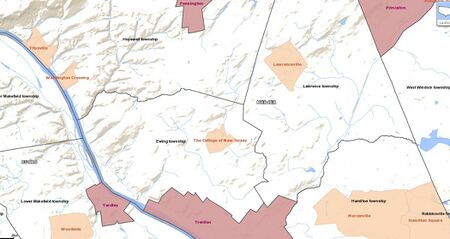 | |
| Country | |
| State | |
| County | Mercer |
| Area | |
| • Total | 0.45 sq mi (1.17 km2) |
| • Land | 0.43 sq mi (1.11 km2) |
| • Water | 0.03 sq mi (0.07 km2) |
| Elevation | 121 ft (37 m) |
| Population (2020)[35] | |
| • Total | 3,701 |
| • Density | 8,647.20/sq mi (3,340.63/km2) |
| Time zone | UTC−05:00 (Eastern (EST)) |
| • Summer (DST) | UTC−04:00 (Eastern (EDT)) |
| FIPS code | Template:FIPS[36] |
| GNIS feature ID | 2806196[34] |
| Website | www |
The College of New Jersey is a census-designated place (CDP) covering the TCNJ campus.[37]
It first appeared as a CDP in the 2020 Census[34] with a population of 3,701.[38]
| Historical population | |||
|---|---|---|---|
| Census | Pop. | %± | |
| U.S. Decennial Census[39] 2020[40][35] | |||
2020 census
| Race / Ethnicity | Pop 2020[40] | % 2020 |
|---|---|---|
| White alone (NH) | 1,872 | 50.58% |
| Black or African American alone (NH) | 937 | 25.32% |
| Native American or Alaska Native alone (NH) | 14 | 0.38% |
| Asian alone (NH) | 252 | 6.81% |
| Pacific Islander alone (NH) | 1 | 0.03% |
| Some Other Race alone (NH) | 0 | 0.00% |
| Mixed Race/Multi-Racial (NH) | 13 | 0.35% |
| Hispanic or Latino (any race) | 612 | 16.54% |
| Total | 3,701 | 100.00% |
See also
- List of American state universities
- Trenton Computer Festival
Notes
- Jarrold, Rachel M.; Fromm, Glenn (1955). Time the Great Teacher. Princeton, NJ: Princeton University Press.
References
- ↑ 1.0 1.1 "Mission | The College of New Jersey". The College of New Jersey. https://tcnj.pages.tcnj.edu/about/mission/.
- ↑ As of June 30, 2020. U.S. and Canadian Institutions Listed by Fiscal Year 2020 Endowment Market Value and Change in Endowment Market Value from FY19 to FY20 (Report). National Association of College and University Business Officers and TIAA. February 19, 2021. https://www.nacubo.org/-/media/Documents/Research/2020-NTSE-Public-Tables--Endowment-Market-Values--FINAL-FEBRUARY-19-2021.ashx. Retrieved February 21, 2021.
- ↑ 3.0 3.1 3.2 3.3 "Facts & Institutional Figures: 2013–2014". The College of New Jersey. 2013–2014. http://cie.pages.tcnj.edu/files/2014/09/Factbook_2013_FINAL.pdf.
- ↑ "TCNJ At A Glance". The College of New Jersey. http://www.tcnj.edu/~pa/about/glance.html.
- ↑ "Archives and Special Collections at TCNJ Library | R. Barbara Gitenstein Library". https://library.tcnj.edu/about-the-library/archives-and-special-collections/.
- ↑ https://www.tcnjsignalnews.com/ [bare URL]
- ↑ "TCNJ Official Colors". The College of New Jersey. November 2003. http://www.tcnj.edu/~pa/sg/offical_colors.html.
- ↑ Jarrold 1955: 1–6
- ↑ Stout, David. "Trenton State Gets New Name and a Battle", The New York Times , June 28, 1996. Accessed May 10, 2022. "Despite bitter protests from many students, faculty members and alumni, the trustees of Trenton State College voted 8 to 0 yesterday to change the school's name to the College of New Jersey."
- ↑ "Schools & Departments - TCNJ". 14 December 2012. http://tcnj.pages.tcnj.edu/academics/schools/.
- ↑ "Liberal Learning :: The College of New Jersey". The College of New Jersey. 2008-06-18. http://www.tcnj.edu/~liberal/.
- ↑ Jarrold 1955: 6
- ↑ "The College of New Jersey (TCNJ)". Campusexplorer.com. http://www.campusexplorer.com/colleges/C8FC0CD9/New-Jersey/Trenton/The-College-of-New-Jersey/.
- ↑ 14.0 14.1 "The College of New Jersey Rankings". U.S. News & World Report (U.S. News & World Report). 2022-10-08. https://www.usnews.com/best-colleges/the-college-of-new-jersey-2642/overall-rankings.
- ↑ "The College of New Jersey - The Princeton Review College Rankings & Reviews". https://www.princetonreview.com/college/college-new-jersey-1023902.
- ↑ TCNJ Housing. (n.d.). In Housing at TCNJ. https://housing.tcnj.edu/facilities/
- ↑ Archived at Ghostarchive and the Wayback Machine: College of New Jersey Extended. YouTube. 10 December 2013. Retrieved 29 May 2015.
- ↑ Campus Town Kicks Off at The College Of New Jersey – Yahoo News
- ↑ "campus town". http://www.campustowntcnj.com/.
- ↑ "Gov. Christie speaks at The College of New Jersey's Campus Town groundbreaking in Ewing". NJ.com. 28 September 2013. http://www.nj.com/mercer/index.ssf/2013/09/christie_speaks_at_the_college_of_new_jerseys_campus_town_groundbreaking.html.
- ↑ "Construction on TCNJ's $50 million student housing and retail complex delayed a year". NJ.com. 16 June 2013. http://www.nj.com/mercer/index.ssf/2013/06/construction_on_tcnjs_50_million_student_housing_and_retail_complex_delayed_a_year.html.
- ↑ TCNJ's editorial staff. "$ocial network". http://www.tcnjmagazine.com/?p=5379.
- ↑ "TCNJ Greek Life". Tcnjigc.wordpress.com. http://tcnjigc.wordpress.com/.
- ↑ "Yearbook's fate sealed" (in en-US). The Signal. 2018-02-06. http://www.tcnjsignal.net/2018/02/06/yearbooks-fate-sealed/.
- ↑ Gould, Kathy (October 22, 1965). "TSC Radio Station Expands Facilities - Obtains FM License". The Signal. https://dr.tcnj.edu/handle/2900/1355.
- ↑ "Six new shows lead LTV resurgence" (in en-US). The Signal. 2008-02-20. http://www.tcnjsignal.net/2008/02/20/sixnewshowsleadltvresurgence/.
- ↑ "TCNJ Athletics Championship Records". http://www.tcnjathletics.com/Pdfs/gen/2006/11/27/AthleticsAtTCNJFall2006.pdf.
- ↑ "Lions Stadium". Tcnjathletics.com. 1984-09-14. http://www.tcnjathletics.com/sports/2003/4/23/stadium.aspx.
- ↑ "History of Lions Hockey | The College of New Jersey Lions" (in en). http://tcnj.pointstreaksites.com/view/njlions/tcnj-ice-hockey-history-alumni/history-of-lions-hockey.
- ↑ "Lions freeze opponents to take CSCHC Cup" (in en-US). The Signal. 2018-02-20. http://www.tcnjsignal.net/2018/02/20/lions-freeze-opponents-to-take-cschc-cup/.
- ↑ "Juda Charles Bennett". http://english.pages.tcnj.edu/faculty-staff/juda-charles-bennett/.
- ↑ "Donna Shaw". http://english.pages.tcnj.edu/faculty-staff/donna-shaw/.
- ↑ "ArcGIS REST Services Directory". United States Census Bureau. https://tigerweb.geo.census.gov/arcgis/rest/services/TIGERweb/Places_CouSub_ConCity_SubMCD/MapServer/5/query?where=STATE='34'&outFields=NAME,STATE,PLACE,AREALAND,AREAWATER,LSADC,CENTLAT,CENTLON&orderByFields=PLACE&returnGeometry=false&returnTrueCurves=false&f=json.
- ↑ 34.0 34.1 34.2 "The College of New Jersey Census Designated Place". United States Geological Survey. https://geonames.usgs.gov/apex/f?p=gnispq:3:::NO::P3_FID:2806196.
- ↑ 35.0 35.1 "Census Population API". United States Census Bureau. https://api.census.gov/data/2020/dec/pl?get=P1_001N,NAME&for=place:*&in=state:34&key=5ccd0821c15d9f4520e2dcc0f8d92b2ec9336108.
- ↑ Geographic Codes Lookup for New Jersey, Missouri Census Data Center. Accessed June 9, 2023.
- ↑ State of New Jersey Census Designated Places - BVP20 - Data as of January 1, 2020, United States Census Bureau. Accessed February 1, 2023.
- ↑ "The College of New Jersey CDP, New Jersey". https://data.census.gov/cedsci/profile?g=1600000US3472580.
- ↑ "Decennial Census of Population and Housing by Decades". US Census Bureau. https://www.census.gov/programs-surveys/decennial-census/decade.html.
- ↑ 40.0 40.1 "P2 HISPANIC OR LATINO, AND NOT HISPANIC OR LATINO BY RACE – 2020: DEC Redistricting Data (PL 94-171) – The College of New Jersey CDP, New Jersey". https://data.census.gov/cedsci/table?q=p2&g=1600000US3472580&tid=DECENNIALPL2020.P2.
External links
 KSF
KSF